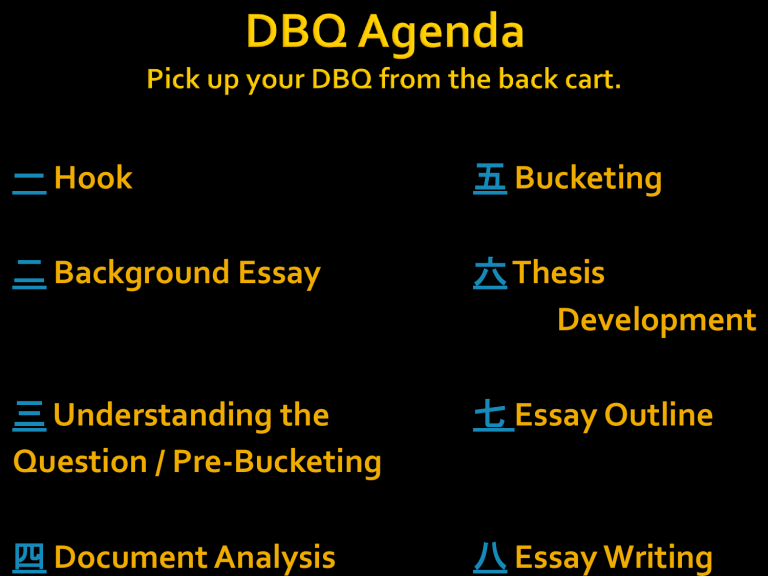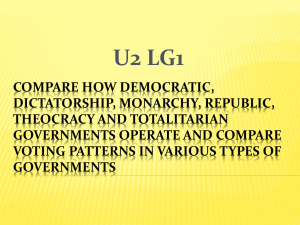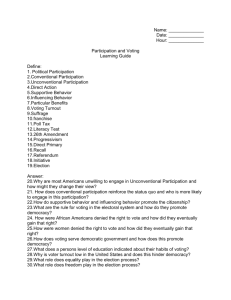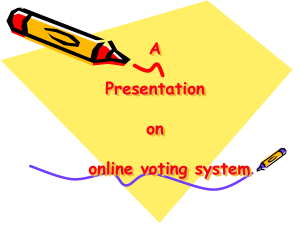四 Document Analysis and Questions
advertisement

一 Hook 五 Bucketing 二 Background Essay 六 Thesis Development 三 Understanding the Question / Pre-Bucketing 七 Essay Outline 四 Document Analysis 八 Essay Writing A DBQ for civics When you get your packet, write your name and class period on the top line. The principal has asked you to help choose the rule for next semester’s study hall. Here are the four options: Students can decide for themselves whether to do their homework in study hall. Students don’t have to do homework in study hall if they have at least a B average. Students who do their homework in study hall (or complete it) will get a vending machine credit in the lunchroom. Students who do not do their homework in study hall will get detention. Turn to page 335 and follow along with the pictures as we click through history. abc def ghi Skim the background essay for these words and use context clues and nearby student to come up with approximation definitions. You have 6 minutes. electorate consent of the governed legitimacy registration compulsory Check your definitions. Did you get close? Add as much as you need to from these definitions. electorate – the voters consent of the governed – a theory of government as being an instrument of the people who have consented to give it certain powers in return for protecting their basic rights (tl;dr permission to be ruled) legitimacy – authenticity (legit!) registration – process of recording the identification and residence of a voter compulsory – mandatory or required Please follow along with your finger as I read the background essay aloud. electorate – the voters consent of the governed – a theory of government as being an instrument of the people who have consented to give it certain powers in return for protecting their basic rights (tl;dr permission to be ruled) legitimacy – authenticity (legit!) registration – process of recording the identification and residence of a voter compulsory – mandatory or required DO NOT GET INTO YOUR GROUPS UNTIL I’VE READ ALL THESE INSTRUCTIONS! • Your group is based on your row (so no more than 4 per group). • Move your desks together and keep apart from other groups. • Re-read the background essay on page 333 together. • The group leader (the person whose birthday comes up next) will start by reading the first paragraph. • Everyone in the group will then share their first impression starting with the person to the left of the group leader. • Everyone will write one of those quickthinks in the margin of the DBQ. (YOU CAN GET INTO GROUPS NOW) Turn to page 335 again. As a group, answer the background essay questions. Check your work: do your answers have this information? • I will read the answers in the teacher’s guide out loud. • Please put a checkmark next to the ones that you feel you “got right.” • If you need to see the teacher’s guide, come see me later. 1. 2. What is the analytical question asked by this mini-Q? see title page What terms in the question need to be defined? maybe required, maybe vote Rewrite the question in your own words. 3. Should Americans have to vote? Should voting become a requirement for American citizens? Should we make people vote? Should folks haveta vote? YES Reason #1 NO Reason #2 Reason #3 Document number or letter ______ Title of Document (if present) Source (Where did the document come from?) Date of document Author of Document Primary Source Possible Author Bias / Point of View Secondary Source What important facts can I learn from this document? What inferences can I make from this document? How does this document help answer the question? Overall, what is the main idea of the document? Analytical category (bucket): Document number or letter ______ Title of Document (if present) Source (Where did the document come from?) Date of document Author of Document Primary Source Possible Author Bias / Point of View Secondary Source What important facts can I learn from this document? What inferences can I make from this document? How does this document help answer the question? Overall, what is the main idea of the document? Analytical category (bucket): In document A , put a star next to the harshest punishment. Circle the countries with that harsh punishment. In document B, write one guess why people without a high school diploma are not likely to vote as more educated folks. Write another guess about why votes under 30 are not as likely to vote as older Americans. In documents C, D, E, and G, underline the sentences that makes the best point (in your opinion). In document F, make sure you read the sentence from 1924. Document A Many Americans associate compulsory voting only with authoritarian or dictatorial regimes. This chart provides students with a larger portrait many well-known modern democracies. Within the United States, the revolutionary era (1777) constitution of the state at Georgia called for compulsory voting. In the Progressive Era, both North Dakota (1898) and Massachusetts (1918) amended their constitutions to allow compulsory voting, but neither legislature ever passed a law to make voting compulsory. As the International Institute for Democracy Electoral Assistance notes, the list of countries with compulsory voting systems needs to be understood in terms of how such laws are upheld. Some countries quite vigorously enforce their systems of compulsory voting, while others merely have it on the books. The extra notes on the chart help explain some of these differences. See http://www.idea.int/vt/compulsory_voting.cfm for more information. Document B An important fact about voting in the United States is that turnout varies significantly among different portions of the population. Not all groups participate at the same rate, and certain variables are very determinative of whether or not someone in that group will vote. The United States Elections Project at George Mason University has studied several of these variables. Two of the most significant are voter age and voter education. See http://elections.gmu.edu/CPS_2008.html for more information. Document C John Dean became legal counsel to the president of the United States in July 1970 at age thirtyone. He served as White House lawyer to President Richard M. Nixon from 1970 until 1973. He was involved in covering up the break-in at the Watergate Hotel. Dean pled guilty to one count of obstruction of justice (for which he served four months in prison). He became a key witness in the Senate Watergate Hearings and later in the prosecution of those associated with the scandal. With a felony conviction, Dean could no longer practice law. Document D The countries in the former Soviet Bloc offered citizens little or no real choice in selecting members of their government. The Union of Soviet Socialist Republics (USSR or Soviet Union) abolished free elections in 1919. For most of its history, voters were provided with a single candidate to represent them in the 1,500-member Supreme Soviet, which met less than 60 days a year. Voter turnout was close to 100%. According to a description in TIME magazine from around 1980, “The voters can drop the ballots into the [ballot box] without marking them, signifying assent, or they can step into the booth and cross out the name of the approved candidate, even going so far as to write in another name. The catch-22 is that write-in candidates have no chance; all winners need official approval. The only suspense is how close to 100% each district can come. Anything below a 99% turnout is unthinkable. . . . In 1979, TASS reported a 99.99% turnout, with 174,734,459 people voting for the official candidate and 185,422 either voting against or writing in another name." Document E, part 1 President Carter’s report was written less than six months after the US presidential election of 2000 when thousands of ballots were challenged and recounted in Florida. The results of the Florida recount during the 2000 election gave George W. Bush a majority of votes in the Electoral College. Although Al Gore won a majority of the popular national vote, Mr. Bush became president. The 2000 election caused great controversy. For over 30 days, no one knew the outcome. The voting procedures in Florida were revealed to vary dramatically. Some counties used sophisticated electronic ballots while others used paper ballots. Some ballots were very poorly designed. Election judges were forced to determine the intent of voters whose paper ballots were poorly punched by the voting machines. The result of the election was determined through a series of legal decisions, first in the Florida Supreme Court and ultimately in the Supreme Court of the United States. During and after the election, the voting processes of the United States were closely examined. Document E, part 2 President Carter was struck by the conscientious approach to ensuring the fairness of the election in Peru. His letter implicitly invites the reader to draw comparisons between the system in Peru and what occurred in Florida. The “fraudulent election" Carter refers to took place in 2000, when Alberto Fujimori was President of Peru. Fujimori was completing his second term and sought a third term in violation of the Peruvian constitution. He overrode the Peruvian Congress and Supreme Court and put himself up for election. He won with a bare majority. Shortly afterward, secret videotapes made by Fujimori’s security chief showed that an extraordinary campaign of bribery had made the election possible. Following these disclosures, the people of Peru conducted massive demonstrations. The international community pressured Fujimori to leave office. His offers to stay were rejected, and he announced during a visit to Japan in November 2000 that he was resigning as president. He was captured in 2005 during a visit to Chile, extradited to Peru, tried, convicted, and imprisoned. Document F A central premise of civics education is teaching young people to become informed and engaged citizens. Many supporters of compulsory voting believe that elections are important democratic events in two respects: 1) they are an opportunity to educate citizens about important issues; and 2) they can engage citizens in civic life. Document G In this article, Randy Cohen goes on to refer to surveys that show many Americans lack basic knowledge when it comes to the officials that represent them and the political issues they are facing. You may want to have your students look at some of the survey data available or take an online poll and compare their knowledge with overall results like this Pew political IQ quiz from March of 2011: http://pewresearch.org/politicalquiz/. Cohen is very critical of efforts like MTV’s Rock the Vote. He argues that such nonpartisan efforts to get out the vote are rarely effective and do no good anyway. Such campaigns are likely to rally individuals from each party in the same proportions as those who already go to the polls, having little outcome on an election. Cohen is not opposed, however, to some partisan efforts to encourage voting. He maintains that partisan efforts to educate citizens in support of a candidate or ballot measure that may be in their best interest is a positive way to bring those who may be less informed into the political arena. Reason#1 Reason#2 Reason#3 Many countries use it successfully It improves the legitimacy of the government It forces citizens to get educated A, C C F Reason#1 Reason#2 Reason#3 It doesn’t improve the democratic climate Non-voters are uninformed It requires a national database A,D B, G E Americans should be required to vote because compulsory voting improves the legitimacy of the government Americans should not be required to vote because non-voters will be uninformed voters Grabber: This essay is about voting. (don’t say nothing) What is something that is exciting about voting? Background (2 sentences): You can talk about voting rights in America. You can talk about compulsory voting in the world. Restating the question with key terms defined: Copy what you wrote for page 337, #3. Thesis and road map: Turn your chicken foot into a sentence. Baby Thesis: “The first reason Americans should / should not be required to vote is ________.” “The second reason…” “The third reason…” Evidence: Look at the last two questions on each document. Make sure you use document citations (Doc G)! Argument: Write your opinion about the evidence proves your baby thesis. “This proves that Americans should / should not be required to vote because ________. Conclusion: “Although” statement: Write one reason why the other point of view is right. If your essay is a NOT essay, write one good thing about compulsory voting. If your essay is a FOR essay, write one good argument against compulsory voting. Conclusion: convincing restatement of the main idea. “Compulsory voting is a good / bad idea for America because __CT1____, __CT2____, and __CT3____.” Baby Thesis 1. Baby Thesis 2, Baby Thesis 3. Clinch your argument by putting the reader into a world where compulsory voting has happened. Tell her/him something very good or very bad that can happen. Show me your outline when you are finished. Once I have checked your outline, you may start writing. If you need assistance, raise your hand and wait for me to come to you. You may also come to the front table to scroll through this presentation for help on your outline. Good luck! ¡Buena suerte! がんばって! 1. If you have reached this slide, please decorate your DBQ folder. 2. Every slide after this refers to another DBQ. The answers after this will be wrong for this DBQ. Don’t forget your home prep! 3.






